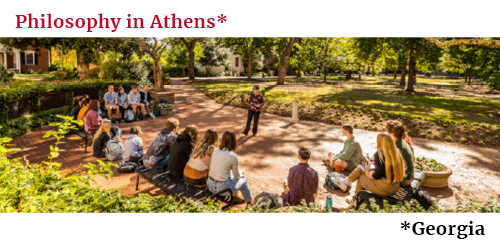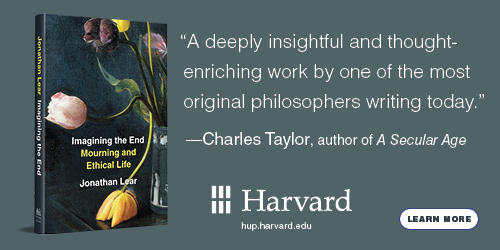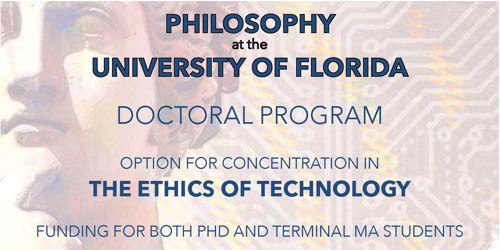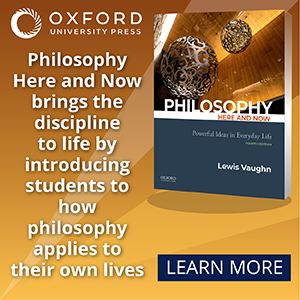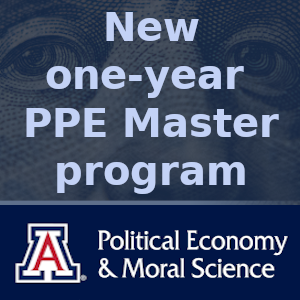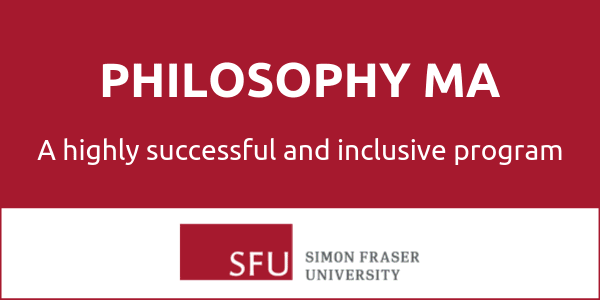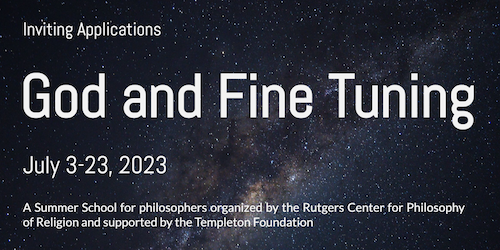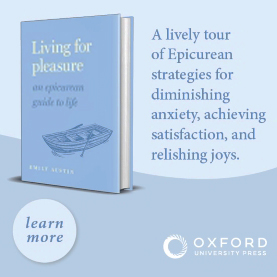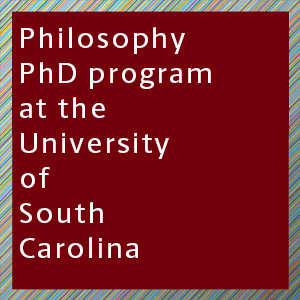AI Images of Philosophers
Published by Reblogs - Credits in Posts,
AI Images of Philosophers & Philosophy (guest post)
Simone Nota, a philosophy PhD student at Trinity College Dublin, has been using AI image generators to create philosophy-related images.

"The Future of Philosophy" (detail) by Simone Nota
AI Images of Philosophers & Philosophy
by Simone Nota
I have recently been toying with AI image generators (DALL-E 2 and Midjourney) to create pictures of philosophers and philosophical ideas. Some pictures are serious, some are funny, but most are kind of both!
While I am far from being an artist (at best a playful experimenter!), here’s a brief description of the process that leads to the creation of these pictures. It all starts with an idea, which is usually embodied in the texts of some great philosophers, and which lends itself to be represented pictorially. For example, Jeremy Bentham once described natural human rights as "nonsense on stilts". Recalling that passage, I wondered what nonsense on stilts would look like, and prompted the AI Midjourney to "imagine" it. The result looks quite like some of the paintings of the French surrealist painter Yves Tanguy.
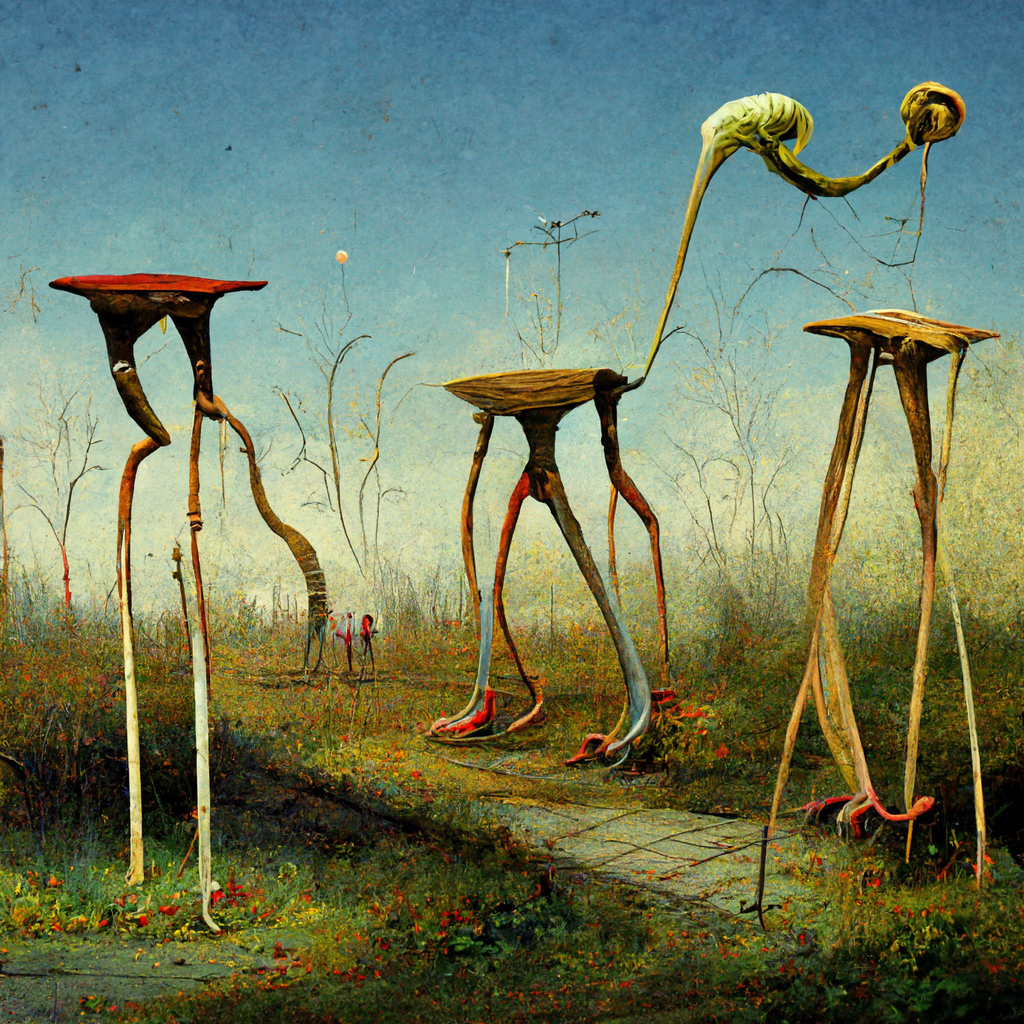
"Nonsense on Stilts" by Simone Nota
This was one of my lucky attempts, where a simple prompt was instantly turned into a decent picture by the (extremely powerful) AI.
Other prompts required a bit of fine-tuning on my part. For example, it took more than 20 attempts to get Wittgenstein’s ladder right. I wanted the ascent on the ladder to be treacherous, yet rewarding, ending as it does with clarity. I also wanted the picture to include Wittgenstein, or his spirit, in some form. I had to strike a fine balance in the description to get even some of this, but I was quite satisfied with the result.
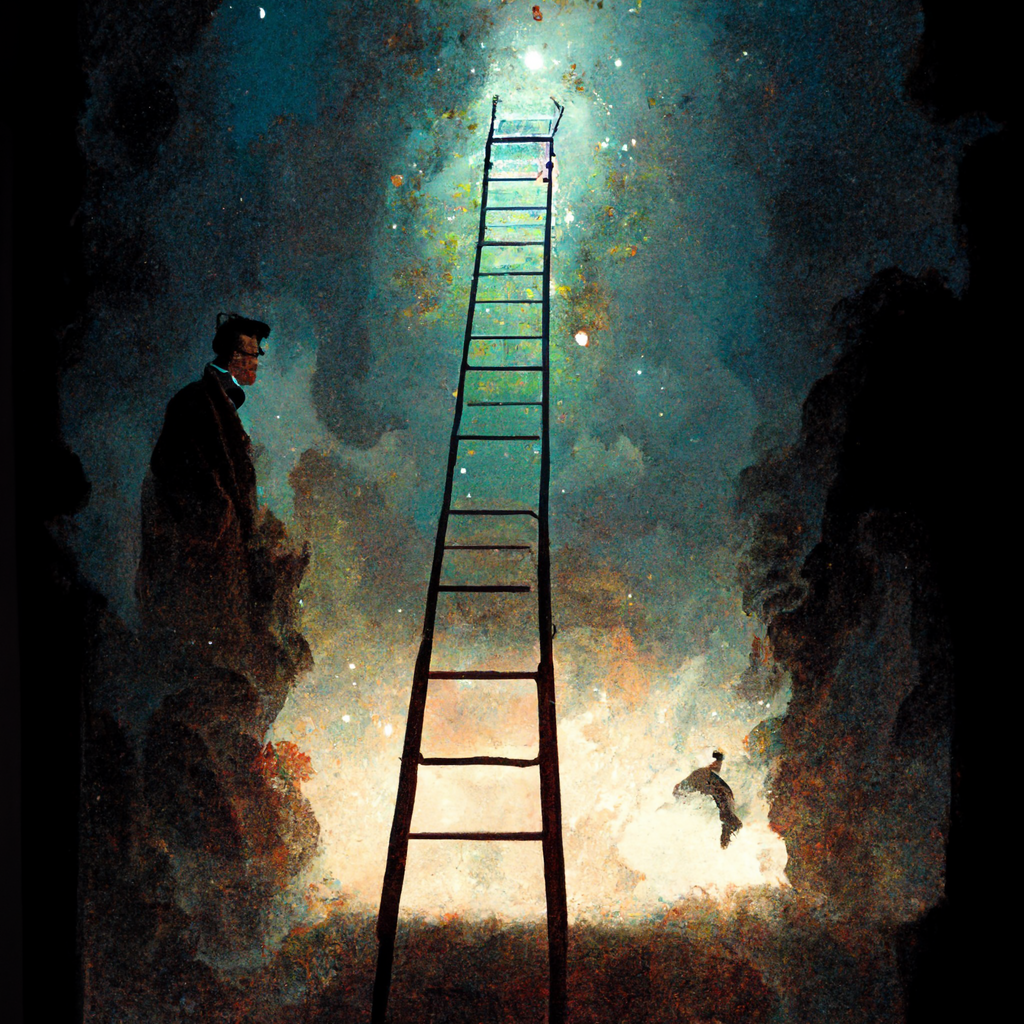
"Wittgenstein’s Ladder" by Simone Nota
I’ve created many other images—ranging from a portrait of a happy Schopenhauer (!)…
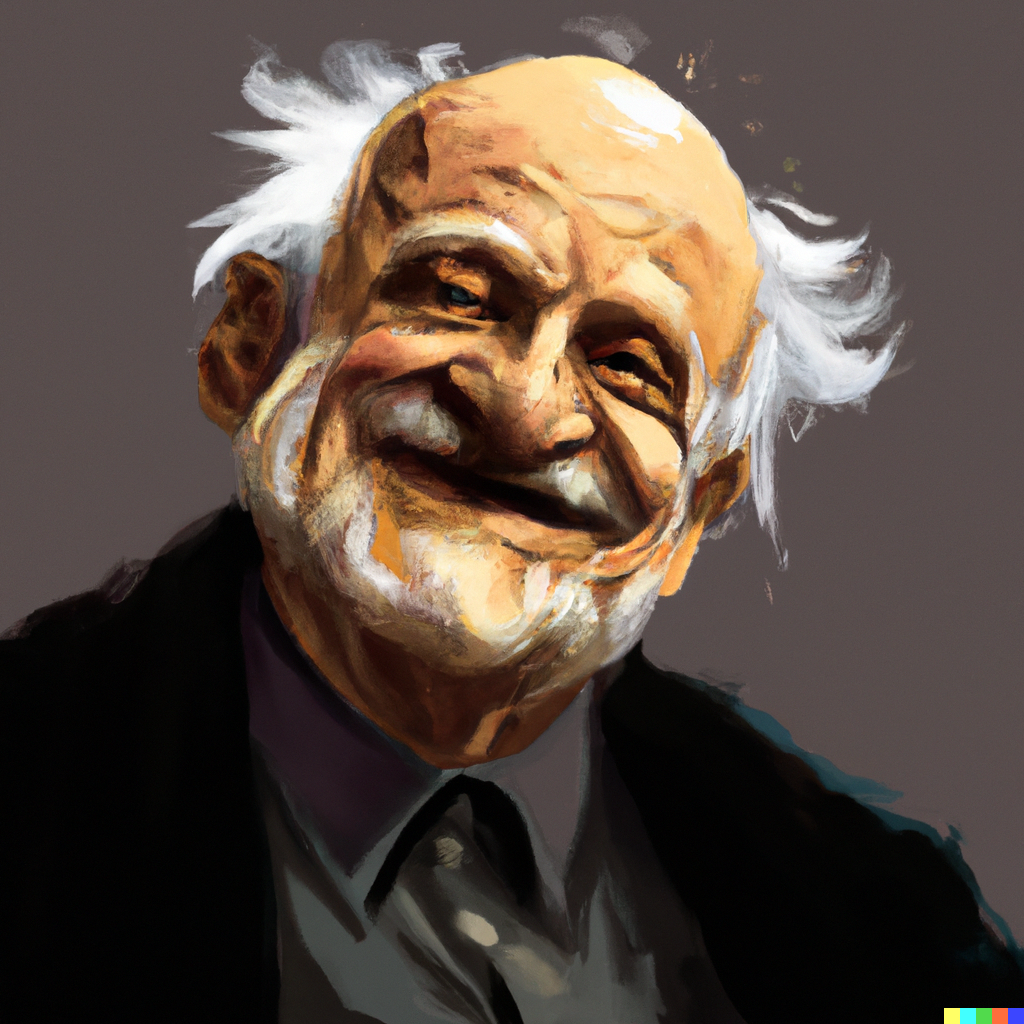
"Schopenhauer, Finally Happy" by Simone Nota
to one of Elena Corner, the first woman to be awarded a philosophy degree.
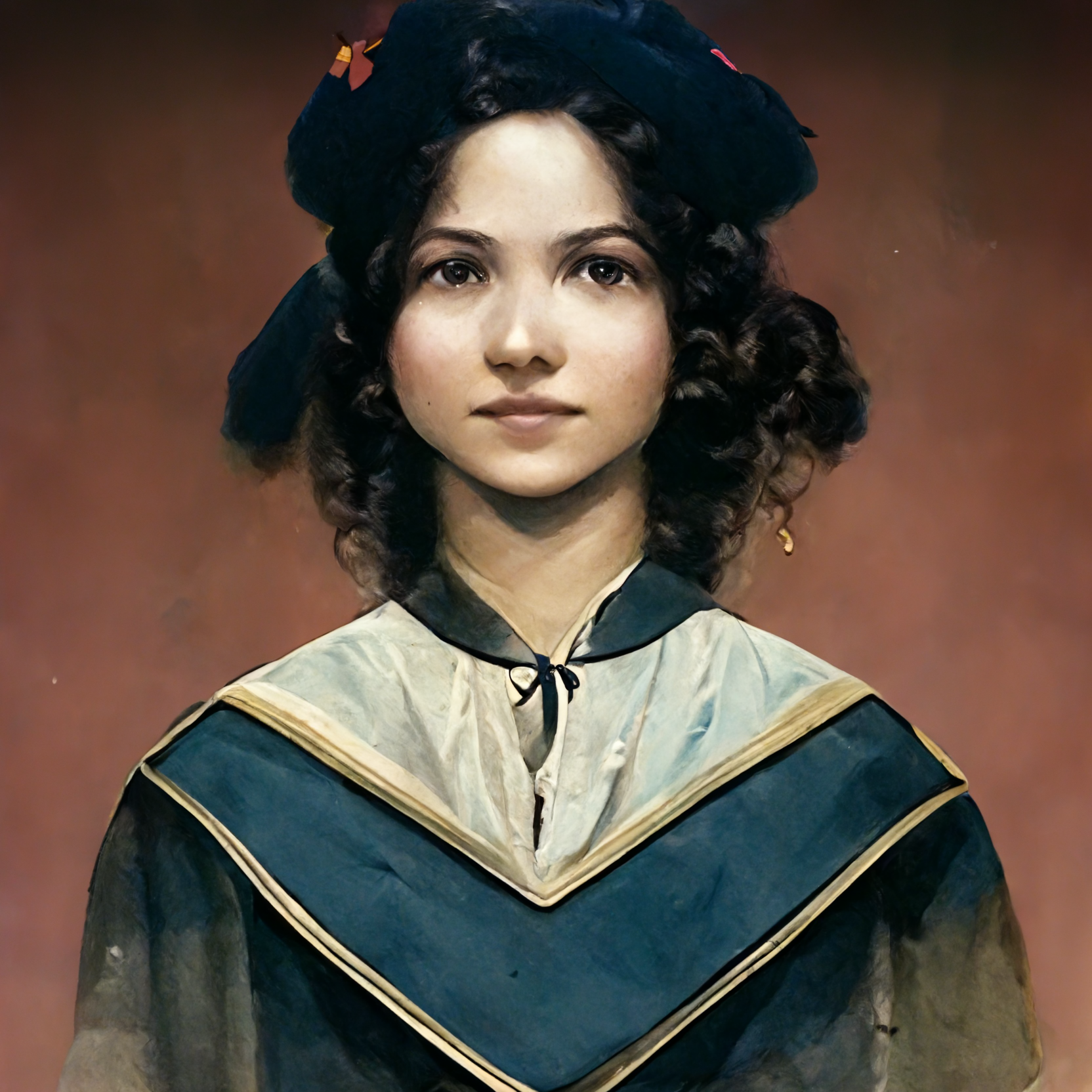
"Elena Lucrezia Corner, First Woman to Be Awarded a PhD in Philosophy" by Simone Nota
I’ve included some other pictures below, and you can find more on my personal website and the platform DeviantArt.
If you have any recommendations on what I should "ask" the AIs next, make a request in the comments here (or drop me an email at snota [at] tcd [dot] ie).

"Kierkegaard’s Leap of Faith" by Simone Nota
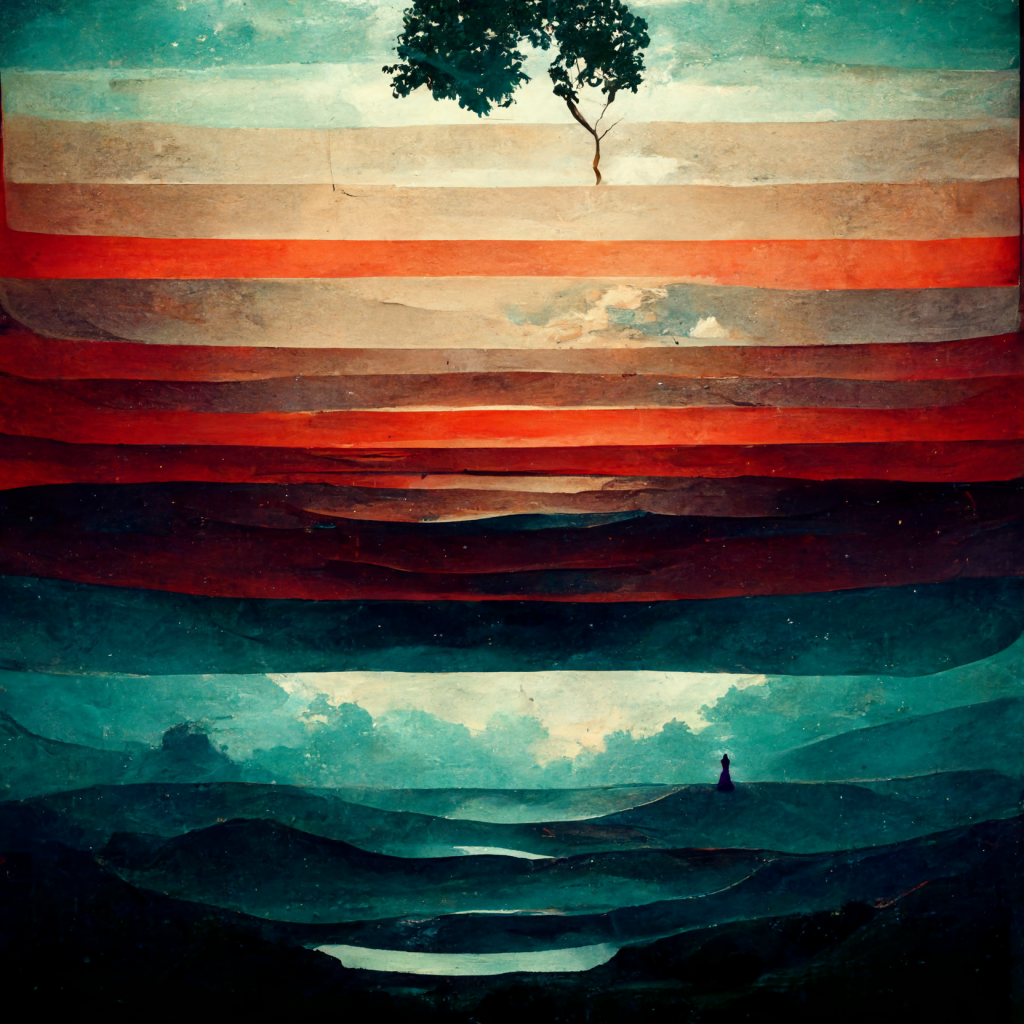
"Transcendental Idealism" by Simone Nota

"Descartes Deceived by the Evil Demon" by Simone Nota
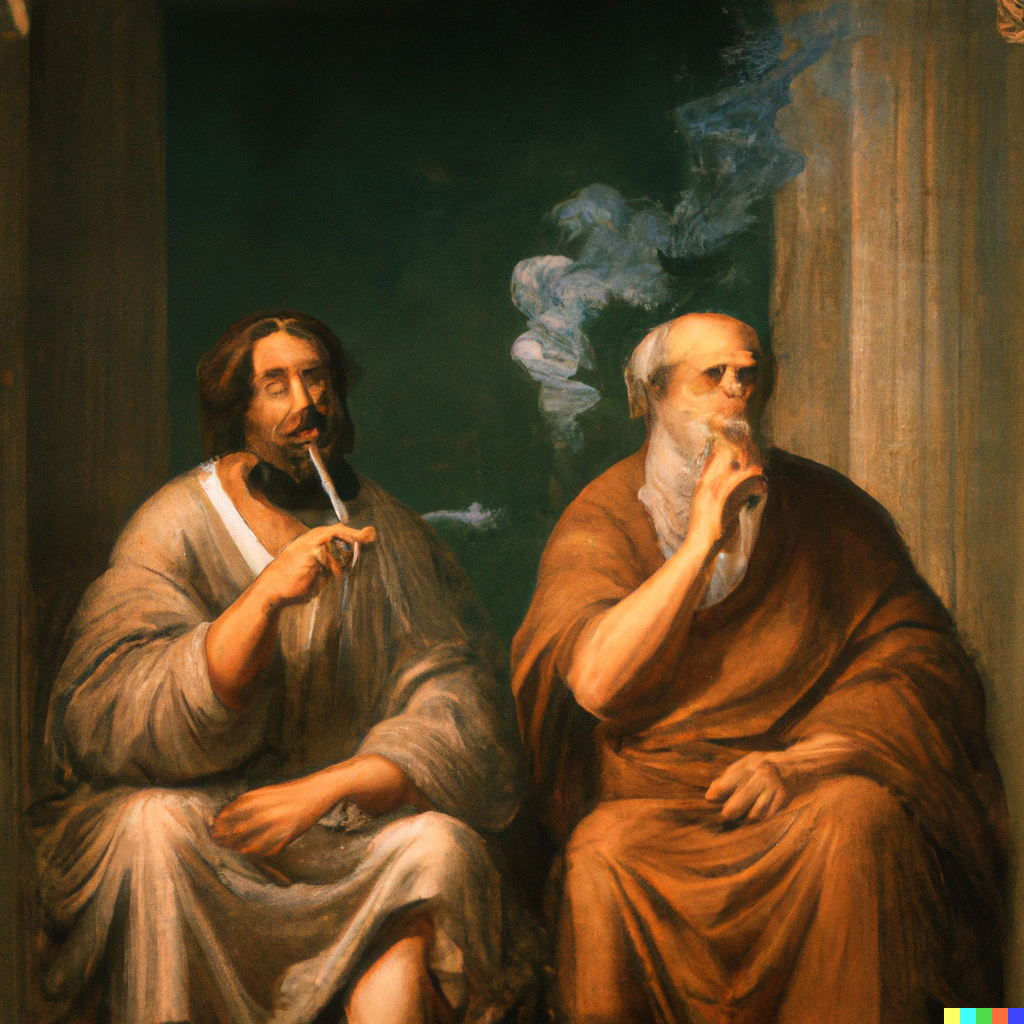
"Plato and Aristotle Just Chillin'" by Simone Nota
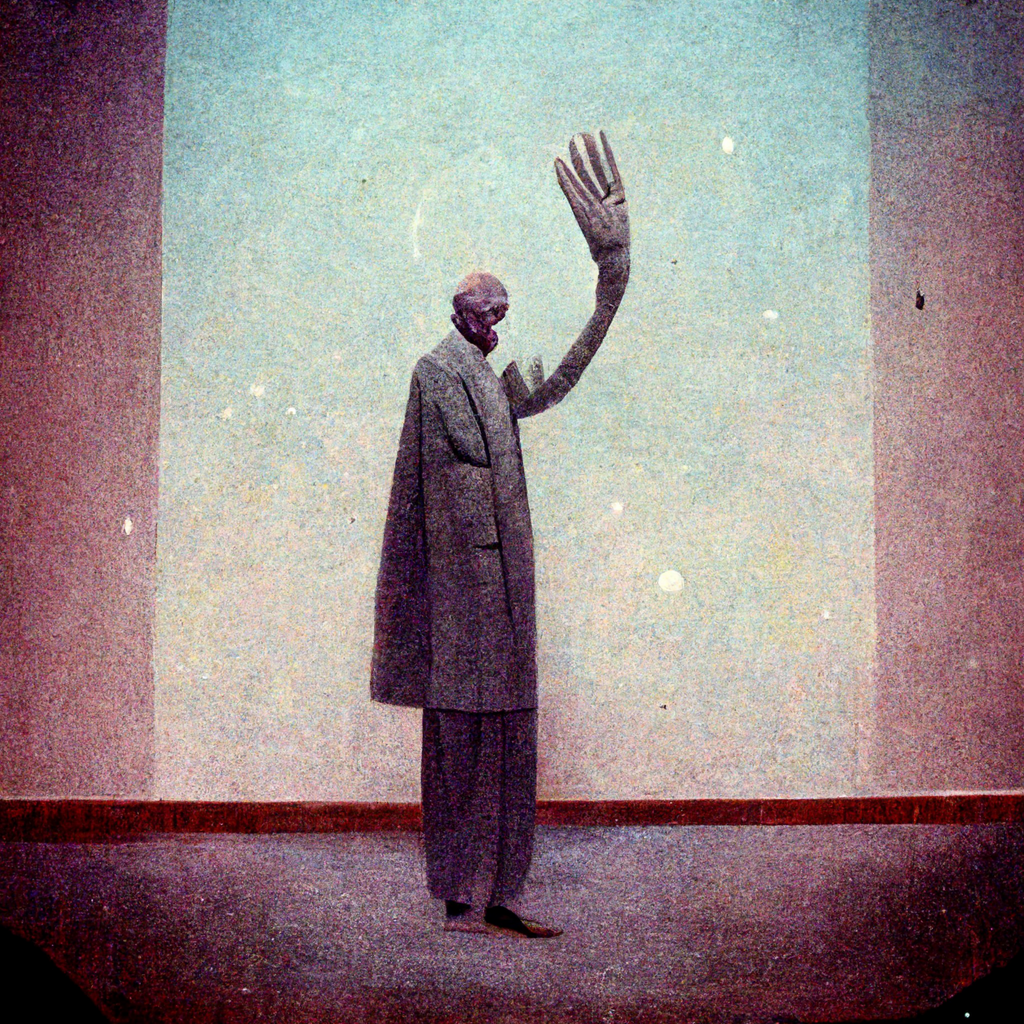
"G.E. Moore’s Hand" by Simone Nota
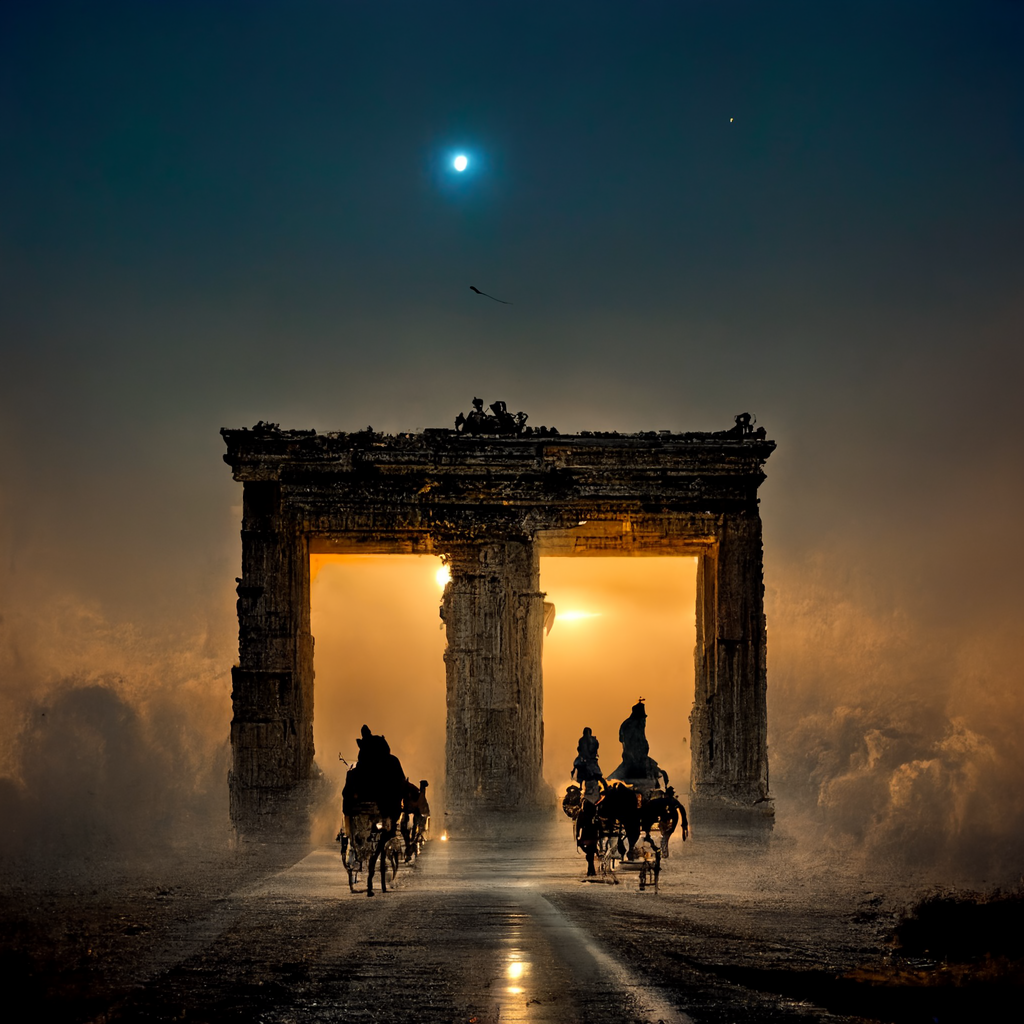
"Parmenides at the Gates of Night and Day" by Simone Nota

"Chalmers Surrounded by Zombies" by Simone Nota
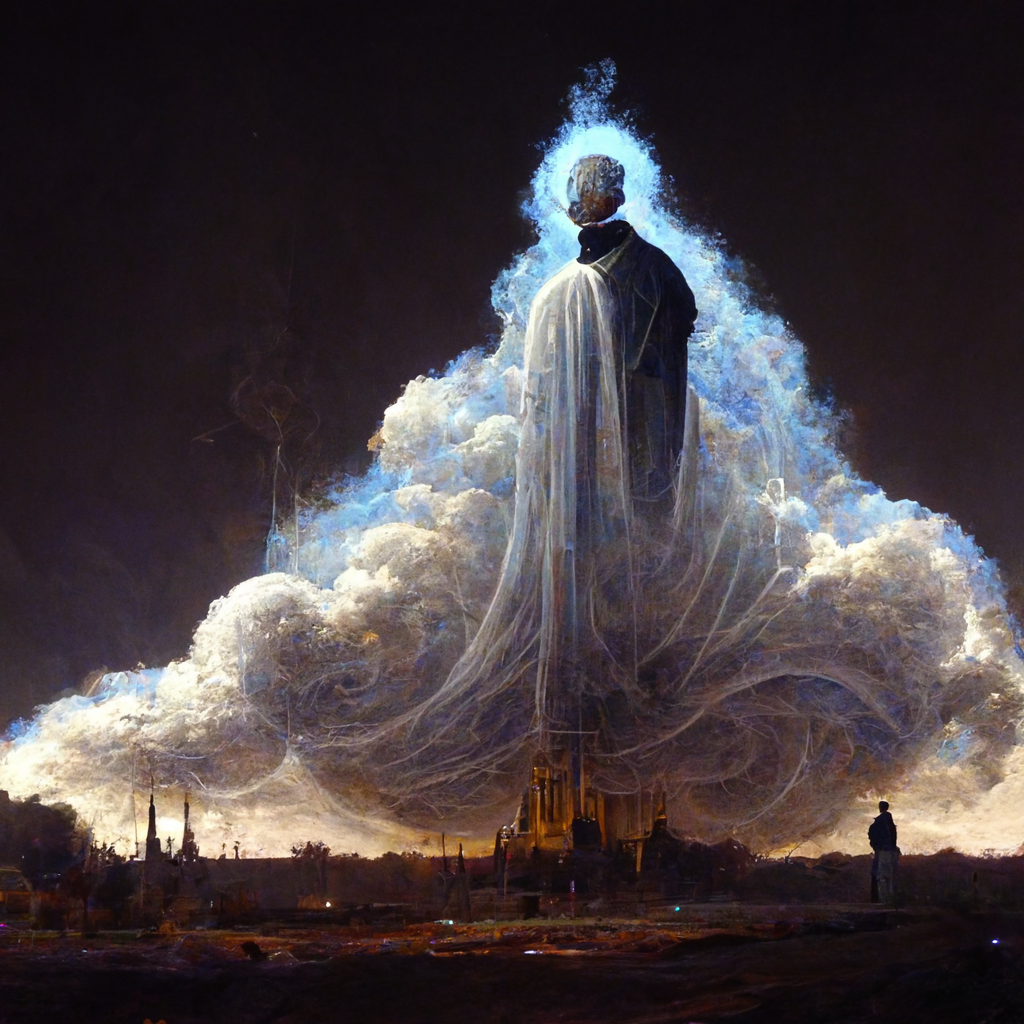
"Berkeley Dissipating the Metaphysical Dust" by Simone Nota
And, because Thanksgiving in the United States is coming up…
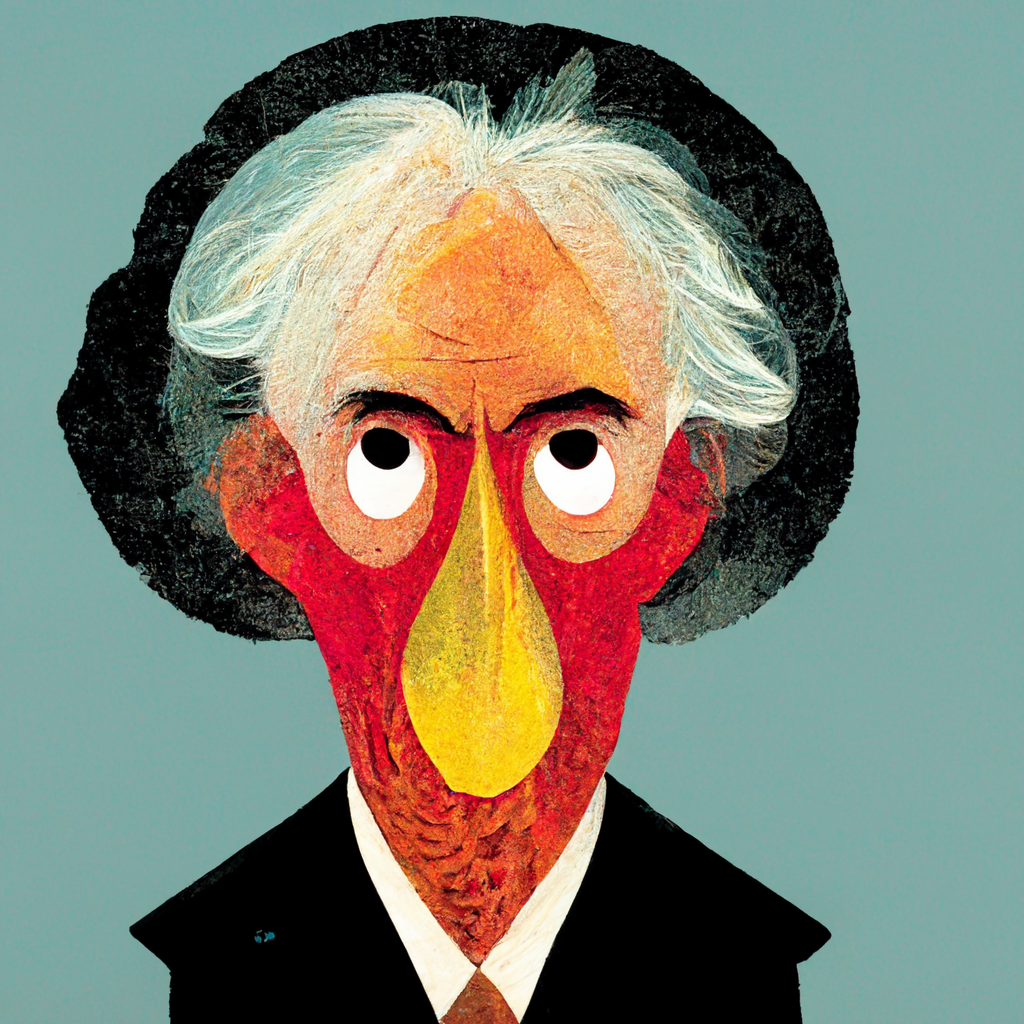
"Russell Is a Turkey" by Simone Nota
Suggestions and discussion welcome.
Related: "Sendakian Portraits of Philosophers Created by AI"

These are so cool! I’m trying to generate pictures of Chomsky on DallE and it always tells me that the request violates their policies. Any idea why? (Even requests like "Noam Chomsky, oil painting" don’t work)Report

I’ve been playing around with these and one thing I’ve noticed (on the basis of an unscientific sample) is that when one types in a generic prompt like "Philosopher juggling bananas" the generic philosopher is always male. A nice case study in algorithmic injustice if the result holds up.Report

Why is Russell a turkey? Am I missing something? Genuinely interested, plus, it’s American Thanksgiving here tomorrow. I like your Parmenides image the most. You may want to take a look at Thomas Wartenberg’s forthcoming book Thoughtful Images: Illustrating Philosophy Through Art. (As may other readers here.) It’s forthcoming soon from OUP; here’s a link. https://global.oup.com/academic/product/thoughtful-images-9780197650547?cc=us&lang=en&;Report


These are great, and it’s nice to see someone putting in prompts that don’t involve samurai berserkers or futuristic cities with spaceships. I’m on Midjourney. This one was "philosophy and the mirror of nature" from the Rorty book. Cheers.Report

These are good. Wonder how u balance AI and human thoughts. This is itself a philosophical problem.
Instead of philosophers, u may try current problems in reality, like:
War, religion hatred, truth in politics, east and west, conscience, time and space, illness and virus, human in nature and in space, future in the past,Report
Recent Comments
Subscribe
Archives
- November 2022
- October 2022
- September 2022
- August 2022
- July 2022
- June 2022
- May 2022
- April 2022
- March 2022
- February 2022
- January 2022
- December 2021
- November 2021
- October 2021
- September 2021
- August 2021
- July 2021
- June 2021
- May 2021
- April 2021
- March 2021
- February 2021
- January 2021
- December 2020
- November 2020
- October 2020
- September 2020
- August 2020
- July 2020
- June 2020
- May 2020
- April 2020
- March 2020
- February 2020
- January 2020
- December 2019
- November 2019
- October 2019
- September 2019
- August 2019
- July 2019
- June 2019
- May 2019
- April 2019
- March 2019
- February 2019
- January 2019
- December 2018
- November 2018
- October 2018
- September 2018
- August 2018
- July 2018
- June 2018
- May 2018
- April 2018
- March 2018
- February 2018
- January 2018
- December 2017
- November 2017
- October 2017
- September 2017
- August 2017
- July 2017
- June 2017
- May 2017
- April 2017
- March 2017
- February 2017
- January 2017
- December 2016
- November 2016
- October 2016
- September 2016
- August 2016
- July 2016
- June 2016
- May 2016
- April 2016
- March 2016
- February 2016
- January 2016
- December 2015
- November 2015
- October 2015
- September 2015
- August 2015
- July 2015
- June 2015
- May 2015
- April 2015
- March 2015
- February 2015
- January 2015
- December 2014
- November 2014
- October 2014
- September 2014
- August 2014
- July 2014
- June 2014
- May 2014
- April 2014
- March 2014
Heap of Links
- "I have exposed myself to the enmity of all metaphysicians, logicians, mathematicians, and even theologians" -- David Hume is interviewed at 3:16AM
- Electrons seem to spin, but actually don’t. So what is really going on? -- Scientific American considers the answer given by philosopher Charles Sebens (Caltech)
- "It’s the method of using opposing views to seek truth; Hegel thought his own style of it was better than Plato’s" -- Hegel was a category on Jeopardy! last night
- "The organoids are coming!" -- and their use is a step forward not just scientifically, but morally, says Katharine Gammon
- "Nothing is true": big, if true -- David Liggins (Manchester) on why we should take alethic nihilism seriously
- "Weirder options are conceivable, but exceedingly improbable" -- two physicists have "calculated an equation that counts universes. And they’ve made the striking observation that universes like ours seem to account for the lion’s share of the conceivable cosmic options"
- "Twitter makes preexisting elites accessible, but it also creates its own elites… Still, I think our situation with hierarchy is improved by Philosophy Twitter, not because the hierarchy it institutes is more intrinsically fair, but because it diversifies the unfairness of hierarchy" -- Mason Westfall (WUStL) applies the multiple-status-hierarchies approach to unfairness to the world of academic philosophy
- "Having a higher sense of purpose appears protective against all-cause mortality," according to a recent study -- or to put it another way: a purpose of purpose in life is life
- "I take these to be the most important human achievements — language, literacy, human rights and the spread of these things — but I think our next level up is for everyone to have the conceptual framework for their own life be open to them for modification and reflection" -- Agnes Callard (Chicago) interviewed about her life and work
- "Concepts of philosophical interest vary across cultures, ages, generations, genders, and socio-economics status" -- a video summing up some of the results of the Geography of Philosophy Project, via Edouard Machery (interesting also as an example of philosophy research PR)
- "Even if it were possible, to build infallible memory into machines would mean forgoing some of the important benefits of forgetting" -- Ali Boyle (LSE) on why it's important that AI learns to forget
- "Did any parent ever say to their toddler, ‘The dog… now I can say that because there is exactly one member of that species that is salient to us at the present moment…’? I doubt even Russell did that. But young children learn to use definite descriptions just the same" -- an interview with Paul Elbourne (Oxford)
- "Successful social movements have frequently—and appropriately—drawn on the socially transformative possibilities of imagination to help make space for justice" -- Michele Moody-Adams (Columbia) on the connection between imagination and political life
- "In an overheated debate, your fatigue may lead you to misinterpret the situation and believe that your opponent is too dim or too deluded to see the truth… We humbly suggest that sometimes it’s not them; it’s you" -- Nathan Ballantyne (Arizona State) and Jared Celniker and Peter Ditto (UC Irvine) on "persuasion fatigue"
- "Leopards break into the temple and drink the sacrificial vessels dry; this is repeated over and over; eventually it can be calculated in advance and becomes part of the ceremony" -- Kafka's aphorisms (via Oran Magal)
- "Why lotteries and not voting? The Athenians weren’t fools; they learned through bitter trials that elections are tools of elites" -- Nicholas Coccoma discusses the case for abolishing elections in Boston Review
- The first philosophy unboxing video — Pete Mandik (William Paterson) contributes to the popular YouTube genre
- "It’s fine if a vindicatory strategy is question-begging, so long as it achieves a kind of explanatory unity through which mysteries are not left to linger. And I think my strategy does just that." -- Andrew Sepielli (Toronto) is interviewed about his "pragmatist quietism" in meta-ethics at 3:16AM
- "A Søren Kierkegaard in skirts" -- Kristin Gjesdal (Temple) on how Ibsen's "women characters play out ideas and positions on stage"
- 9 philosophers interviewed about "Philosophy Illustrated" -- in a New Books Network podcast
- "It’s a commonplace among lecturers that students don’t know how to read anymore" -- so what advice should we give them about how to do it better? Martin Lenz (Groningen) has some suggestions
- One might think that much AI art isn’t just bad, but that it’s not art -- but "AI art is art as much as readymades, minimalist art, or photography" argues G. M. "Boomer" Trujillo, Jr. (Texas - El Paso)
- The philosopher who helped kill the king -- on the "mess of paradoxes" in Lucy Hutchinson's "war against the disorder of England’s craven nobility"
- "Constructionism was never a matter of ‘just saying whatever’, and science can never be simply a matter of reading the dictates of the natural world off of our instruments" -- Justin E. H. Smith with an appreciation of Bruno Latour and of what it means to "have a choice as to how read the world."
- "When asked to select Dennett’s answer to a philosophical question from a set of five possible answers, with the other four being [GPT-3] digi-Dan outputs, Dennett experts got only about half right" -- Eric Schwitzgebel (UC Riverside) et al on what happens when large language models are trained on philosophical texts
- "Unlike most scientific thinkers of the period… Cavendish insisted that humans are part of nature—not above it—and thus that we lack the perspectival leverage to see and understand its operations" -- on Margaret Cavendish's combination of fantastical imagination, thoroughgoing materialism, and desire for immortality
- "As we bridge the gulf between now and then to sympathize with ourselves at other times, we sympathize, too, with the suffering of others" -- Kieran Setiya (MIT) on his chronic pain and its philosophical lessons
- A philosopher is invited to take part in a Netflix television show with a magician, the premise of which is that free will is an illusion -- the magician thinks he has cornered the philosopher, but Christopher Kaczor (Loyola Marymount) is the one with a card up his sleeve
- "Utilitarian longtermism is objectionable. Longtermism sans consequentialism is another matter" -- Elliott R. Crozat (Purdue Global) considers deontological longtermism
- "Most of Earth thus mobilized toward figuring out what is widely thought to be the easiest problem of the three: the line between Anna and not Anna" -- a story by Patrick House about how to delineate the boundaries of consciousness
Tags: Pics, Philosophy, Philosophy Of Art, Metaphilosophy, Zas


